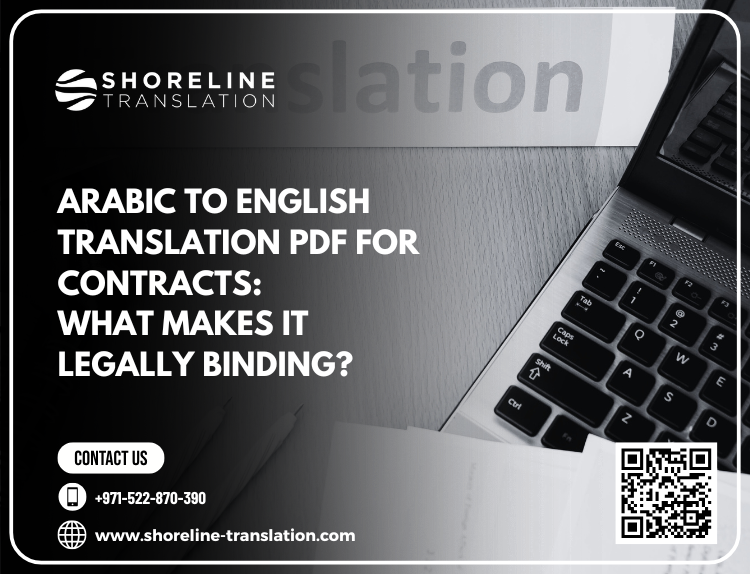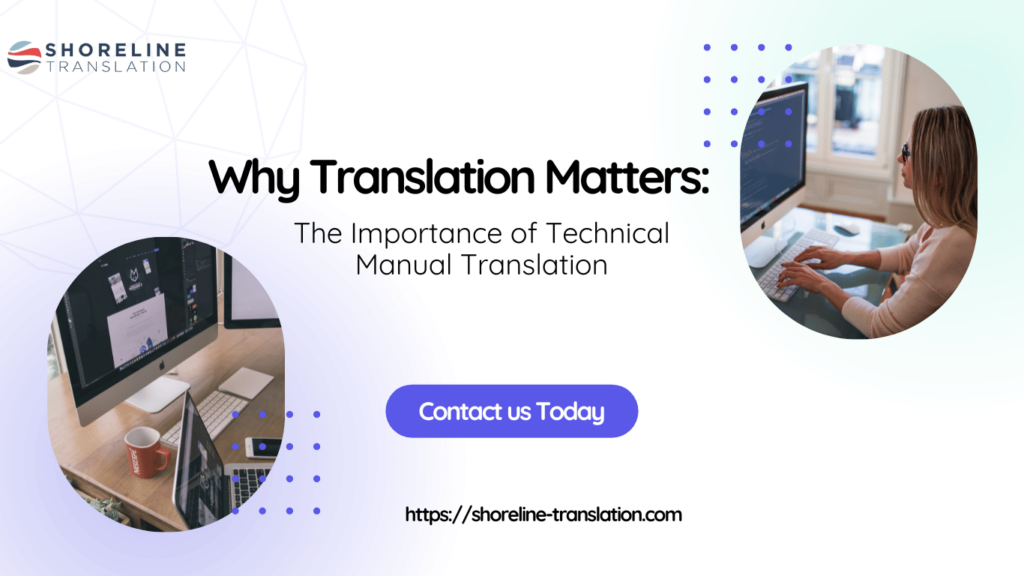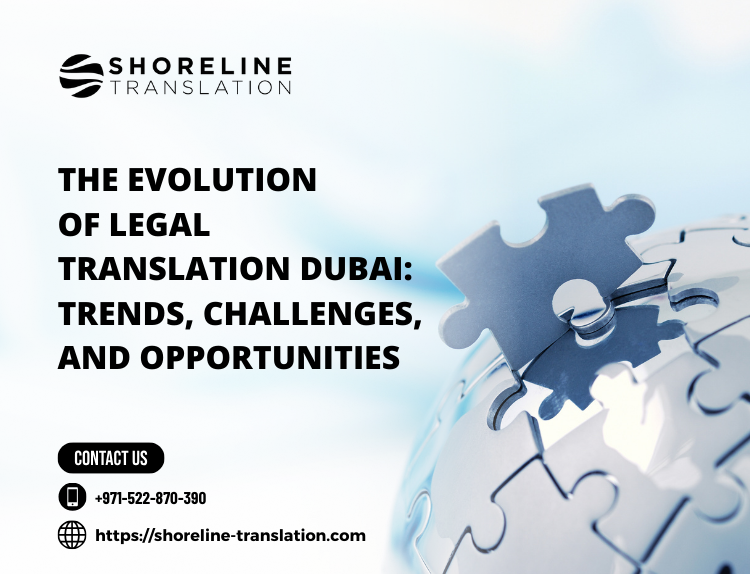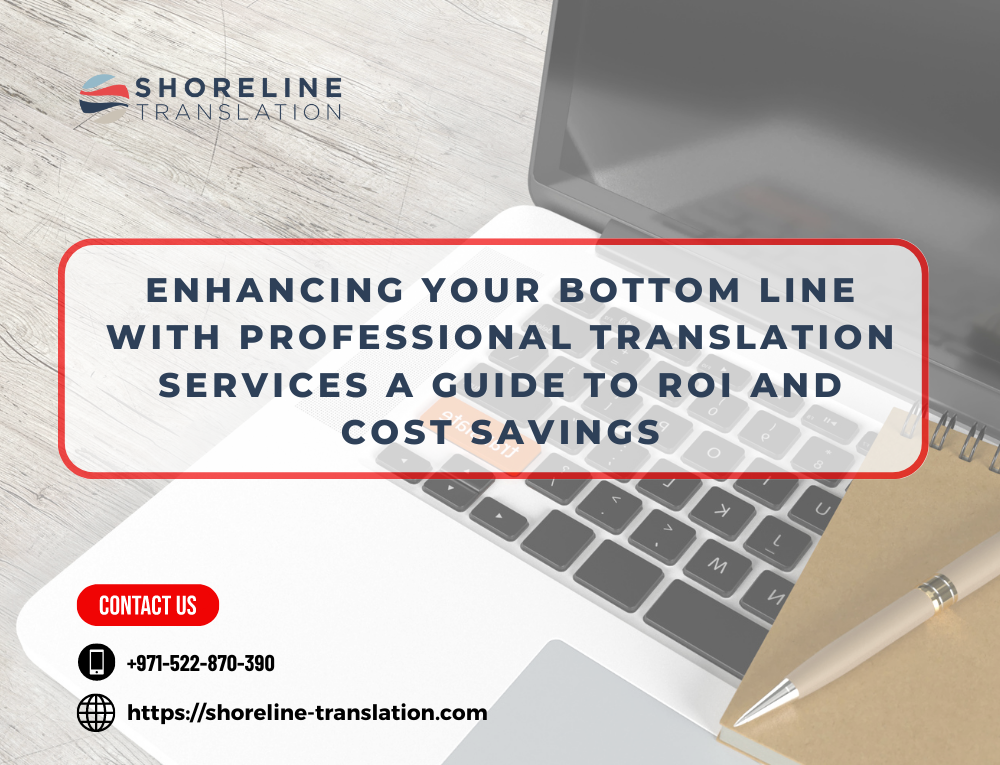Table of Contents
ToggleArabic to English Translation PDF for Contracts: What Makes It Legally Binding?
In an increasingly globalized world, cross-border business agreements are more common than ever. Whether you’re an entrepreneur expanding into Middle Eastern markets or a legal professional handling international contracts, ensuring accurate and legally binding translations is crucial. One of the most sought-after services in this domain is the Arabic to English translation PDF for contracts. But what exactly makes such a translation legally binding?
In this comprehensive guide, we delve into the legal, linguistic, and procedural aspects of translating contracts from Arabic to English, especially in PDF format. We’ll also explore how to ensure your translated documents meet international legal standards and introduce you to Shoreline, a trusted name in professional translation services.

Why Arabic to English Contract Translation Matters
In the globalized business world, accurate Arabic-to-English contract translation is crucial for bridging legal and commercial gaps. It ensures clarity and enforceability, protecting the interests of all parties involved in international agreements.
The Legal Importance of Accurate Translation
Contracts are binding legal documents that define the rights and obligations of parties involved. When these documents are drafted in Arabic and need to be used in English-speaking jurisdictions, or vice versa, accurate translation becomes not just a matter of convenience, but of legal necessity.
A mistranslation can lead to:
- Misinterpretation of obligations
- Legal disputes
- Financial losses
- Contract nullification
Hence, a certified Arabic to English translation PDF ensures that all parties understand the terms identically, preserving the legal enforceability of the contract.
Common Use Cases for Arabic-English Contract Translation
- International business agreements
- Real estate transactions
- Employment contracts
- Government tenders
- Immigration and visa documentation
- Legal proceedings and arbitration
What Makes an Arabic to English Translation PDF Legally Binding?
For an Arabic to English translation of a contract to be legally binding, it must meet several key requirements, as determined by the laws of the jurisdiction where it will be used. A simple, uncertified translation is generally not sufficient for legal purposes. Here are the key factors that make a translated contract legally binding:
1. Certified Translation
A legally binding translation must be certified. This means the translator or translation agency provides a signed statement affirming the accuracy and completeness of the translation. In many jurisdictions, only certified translations are accepted in legal or governmental settings.
Shoreline offers certified Arabic to English translation PDF services, ensuring compliance with legal standards in the U.S., U.K., UAE, and beyond.
2. Qualified Legal Translators
Certified Legal translation is not just about language fluency. It requires deep knowledge of legal terminology in both the source and target languages. A qualified legal translator must:
- Understand both Arabic and English legal systems
- Be familiar with contract law
- Recognize cultural and contextual nuances
Shoreline employs expert legal translators with years of experience in handling sensitive legal documents.
3. Notarization and Apostille (If Required)
In some cases, a translated contract must be notarized or accompanied by an apostille to be recognized internationally. This adds an extra layer of authenticity and legal recognition.
4. Formatting Consistency
When translating contracts into PDF format, the layout and structure must mirror the original document. This includes:
- Clause numbering
- Headers and footers
- Signatures and seals
- Tables and annexes
Shoreline ensures that your Arabic to English translation PDF retains the exact formatting of the original, making it ready for immediate legal use.
Read more about: Certified Arabic to English Translation Online: What Makes It Legally Valid?
Key Features of a Legally Binding Translation PDF
To ensure your translated document is legally binding, it should include:
- Translator’s certification statement
- Translator’s contact information
- Date of translation
- Official seal or stamp (if applicable)
- Page-by-page correspondence with the source document
Shoreline: Your Trusted Partner in Legal Translation
When it comes to professional Arabic to English translation PDF services, Shoreline stands out as a leader in the industry. With a global network of certified legal translators, Shoreline delivers accurate, fast, and confidential translations tailored to your specific needs.
Why Choose Shoreline?
✅ 100% human translation
✅ Expertise in over 100 languages
✅ Specialized in legal, medical, technical, and financial translations
✅ Fast turnaround times
✅ Secure handling of sensitive documents
The Process of Translating Arabic Contracts into English PDF
Translating an Arabic contract into an English PDF is a highly specialized process that requires more than just linguistic proficiency. It involves a series of critical steps to ensure the translated document is legally sound, accurate, and faithful to the original’s intent and legal effect. Step-by-Step Workflow:
Document Submission: Upload your Arabic contract in PDF, Word, or scanned format.
Quote and Timeline: Shoreline provides a transparent quote and estimated delivery time.
Translation by Legal Experts: A certified legal translator handles your document, ensuring accuracy and compliance.
Proofreading and Quality Assurance: Every translation undergoes a rigorous QA process.
Certification and Formatting: The translated document is formatted to match the original and includes a certification statement.
Delivery in PDF Format: You receive a ready-to-use, legally binding English translation in PDF format.
Common Challenges in Arabic to English Contract Translation
Legal professionals face significant challenges in translating Arabic contracts into English due to the fundamental differences in linguistic structure and legal systems. These discrepancies can lead to ambiguity and legal disputes if not handled by a specialized translator.
1. Legal Terminology Differences
Arabic and English legal systems are based on different jurisprudential traditions. Translators must bridge this gap without altering the meaning.
2. Ambiguity in Language
Arabic legal language can be more verbose and interpretive, whereas English legal writing favors precision. Translators must strike a balance between fidelity and clarity.
3. Cultural Nuances
Certain phrases or clauses may carry different implications in Arabic-speaking countries. A skilled translator ensures these are appropriately adapted.
Industries That Rely on Arabic to English Legal Translation
Legal translation from Arabic to English is vital across a range of industries, particularly those engaged in international commerce, finance, and legal affairs. These sectors require accurate translation of contracts, agreements, and official documents to ensure legal compliance and smooth cross-border operations.
- Oil and Gas – Contracts for exploration and production
- Construction and Engineering – Project agreements and tenders
- Healthcare – Medical service contracts and compliance documents
- Finance and Banking – Loan agreements and regulatory filings
- Technology – Licensing and intellectual property contracts
Shoreline has extensive experience across all these sectors, offering tailored solutions for each.
Specialized Considerations for Industry-Specific Arabic to English Translation PDF Services
When dealing with sector-specific contracts, a general translation won’t suffice. Each industry has its own legal jargon, regulatory frameworks, and documentation standards. A tailored approach to Arabic to English translation PDF services ensures that the translated content aligns with both linguistic accuracy and industry compliance.
Financial and Banking Contracts
- Requires precise translation of terms like “interest rate,” “credit facility,” and “collateral,” which may have no direct equivalents in Arabic.
- Must comply with international financial reporting standards (IFRS) and local banking regulations.
- Shoreline’s financial linguists are trained to handle sensitive documents like loan agreements, investment contracts, and shareholder agreements.
Pharmaceutical and Healthcare Agreements
- Involves translating clinical trial contracts, licensing agreements, and regulatory submissions.
- Accuracy is critical due to potential legal liabilities and patient safety concerns.
- Shoreline ensures that all medical-legal documents are translated by professionals with dual expertise in health sciences and legal terminology.
Technology and Software Licensing
- Includes complex clauses related to intellectual property, data privacy, and software usage rights.
- Requires familiarity with both civil law systems (common in Arabic-speaking countries) and common law systems (used in English-speaking jurisdictions).
- Shoreline’s tech-savvy legal translators deliver PDF translations that are both legally sound and technically precise.
Enhancing Contractual Clarity with Contextual Arabic to English Translation PDF Techniques
Beyond mere word-for-word translation, achieving legal clarity in contracts requires a contextual and interpretative approach. This is especially true when converting Arabic contracts into English PDFs, where linguistic structure and legal logic differ significantly.
Contextual Equivalence over Literal Translation
- Legal terms in Arabic often carry cultural or religious connotations that don’t directly translate into English.
- Shoreline’s translators apply contextual equivalence to preserve the legal intent while adapting the language for English-speaking courts and stakeholders.
Clause Harmonization and Cross-Referencing
- Arabic contracts may use flowing narrative styles, while English contracts are more segmented and clause-based.
- Shoreline restructures the translated content to match English legal drafting conventions without altering the original meaning.
- This ensures the Arabic to English translation PDF is not only legally valid but also easy to navigate for legal professionals.
Terminology Consistency Across Multi-Document Agreements
- Many contracts are part of a larger legal framework (e.g., master service agreements, annexes, NDAs).
- Shoreline maintains a translation memory and glossary to ensure consistent terminology across all related documents.
- This reduces ambiguity and strengthens enforceability in multilingual legal contexts.
These advanced techniques elevate the quality of your Arabic to English contract translation PDF, ensuring it meets the highest standards of legal clarity, cultural sensitivity, and professional presentation.
Seal the Deal with Shoreline: Your Legal Translation Ally
When legal precision meets linguistic excellence, you get Shoreline.
Whether you’re a multinational corporation or an individual dealing with cross-border legal matters, Shoreline ensures your Arabic to English translation PDF is:
- Legally compliant
- Professionally certified
- Delivered on time
Contact Shoreline today to get a free quote and experience the gold standard in legal translation services.
Frequently Asked Questions (FAQs)
1. Is a certified translation the same as a notarized translation?
No. A certified translation includes a statement from the translator or agency affirming the translation’s accuracy. A notarized translation involves a notary public who verifies the identity of the translator and witnesses the signing of the certification. Some legal systems may require both.
2. Can I use Google Translate for legal documents?
Absolutely not. Machine translation tools like Google Translate are not reliable for legal documents. They lack context, accuracy, and certification. Legal translations must be done by certified professionals like those at Shoreline.
3. How long does it take to translate a contract from Arabic to English?
Turnaround time depends on the document’s length and complexity. However, Shoreline typically delivers short contracts within 24–48 hours, with expedited options available.
4. What file formats does Shoreline accept and deliver?
Shoreline accepts a wide range of formats including PDF, DOCX, scanned images, and more. Final translations are delivered in PDF format, ready for legal use.
5. Is my information safe with Shoreline?
Yes. Shoreline adheres to strict confidentiality protocols and uses secure file transfer systems. NDAs can be signed upon request to ensure your data remains protected.
Conclusion
In the realm of international law and business, the stakes are too high to risk inaccuracies. A legally binding Arabic to English translation PDF is not just a linguistic conversion—it’s a legal necessity that requires expertise, certification, and precision.
By partnering with a trusted provider like Shoreline, you gain peace of mind knowing your contracts are translated accurately, professionally, and in full compliance with legal standards.
Ready to get started? Request your free quote today and ensure your contracts speak the right legal language.





